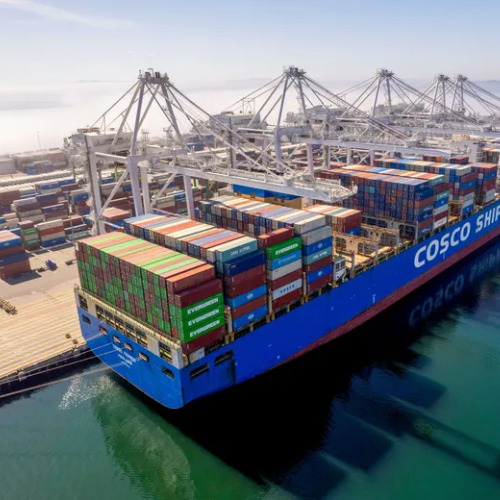The United States is planning to charge new fees on ships that are built in China or fly the Chinese flag when they dock at American ports. The draft executive order, which is being developed by the U.S. government, aims to support American shipbuilders and weaken China’s stronghold over global shipping. The order also warns that U.S. allies should adopt similar measures or face trade penalties.
This move is part of a broader effort to reduce China’s influence on maritime trade. Over the past few decades, China has become the world’s largest shipbuilder, producing over 50% of the world’s merchant vessel capacity each year. In contrast, the U.S. shipbuilding industry has significantly shrunk since its peak in the 1970s. Lawmakers in the U.S., regardless of their political affiliations, are united in their concern that China’s dominance threatens both economic interests and national security.
The draft order states that fees will apply to any ship that is part of a fleet that includes Chinese-built or Chinese-flagged vessels. This means that companies operating even a single China-linked vessel could be subject to these fees when any of their ships arrive in the U.S., even if those specific ships were built elsewhere.
Impact on Major Shipping Companies and Businesses
The proposed policy could lead to significant additional costs for some of the biggest shipping companies in the world. This includes firms based in Europe and Asia, many of which operate fleets that include Chinese-built vessels. Companies that transport essential goods such as food, fuel, and automobiles could also be affected.
Taiwan Captures China-Crewed Ship After Suspicious Undersea Cable Cut
The world’s largest container shipping company has already indicated that it may reduce the number of visits to U.S. ports if the fees go into effect. Other major carriers are also assessing how the proposed rule will impact their operations.
The draft order is similar to a previous proposal made by U.S. trade officials, which suggested charging fees of up to $1.5 million for Chinese-built ships entering American ports. However, the latest version of the order does not specify how much the new fees will be or how they will be calculated. Additionally, while the earlier proposal only applied to fleets where at least 25% of vessels were built in China, the new draft order appears to have removed that threshold, making it potentially broader in scope.
Response from Shipping Companies
French shipping companies have already started taking action in response to the proposal. One company announced plans to expand its U.S.-flagged fleet from 10 to 30 ships over the next four years, which may help it avoid some of the new fees. However, since many shipping companies operate through vessel-sharing agreements with Chinese firms, it remains unclear how they will navigate the new restrictions.
Other companies are evaluating their options, and some may consider adjusting their shipping routes or restructuring their fleets to reduce exposure to the U.S. port fees. The uncertainty surrounding the exact details of the fee structure is leading to cautious decision-making among global shipping firms.
Panama Rejects False Claim on US Government Ships’ Free Canal Passage
Pressure on U.S. Allies and Additional Tariffs on Equipment
In addition to imposing fees on China-linked ships, the U.S. is also urging its allies to adopt similar policies. The draft order includes a warning that countries choosing not to follow America’s lead could face economic retaliation. This means that if an allied nation allows China-linked ships to operate without similar fees, the U.S. could impose its own trade restrictions on that country.
The proposed order also outlines plans to introduce tariffs on Chinese-made cargo-handling equipment. This includes the large cranes and machinery used at ports to load and unload goods. These tariffs aim to reduce reliance on Chinese-built port equipment and encourage investments in American-made alternatives.
The U.S. government argues that China’s dominance in the shipping and logistics industry is a threat to both national security and economic stability. Officials believe that by imposing these fees and tariffs, they can weaken China’s control over global shipping and encourage investment in American shipbuilding and infrastructure.
For now, it remains unclear how shipping companies and global trading partners will respond. The draft order is still under review, and more details are expected to emerge in the coming weeks. However, with growing bipartisan support in the U.S. government, the chances of these fees becoming reality appear to be high.


